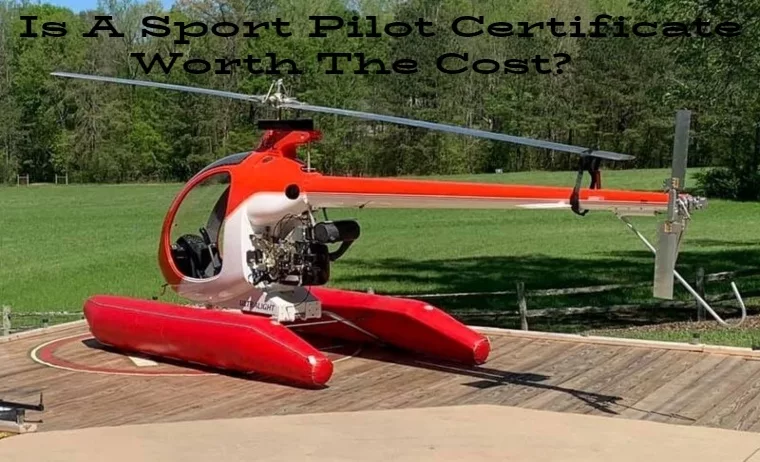
When it comes to freedom, flying is truly the last frontier. I was never asked, “Is Having a Sport Pilot Certificate Worth The Cost?,” my answer would be, Yes, The thrill of mastering the art of manipulating air so we can fly is like no other I have ever experienced. Let’s explore the realm of what the Sport Pilot Certificate is.
Is Having a Sport Pilot Certificate Worth The Cost?
Yes. having a Sport Pilot Certificate is well worth the cost. You will enjoy spending less than a Private Certificate, lower expenses for aircraft purchase, lower maintenance costs, and a multitude of aircraft to choose to fly. Even helicopters!
In the world of aviation, the Sport Pilot Certificate stands out as an appealing entry point for many aspiring pilots.
Introduced by the Federal Aviation Administration (FAA) in the United States in 2004, this certification was designed to make flying more accessible and less burdensome, particularly for those who see flying as a hobby rather than a career path.
But is obtaining a Sport Pilot Certificate truly worth it? Let’s delve into the advantages, limitations, and considerations that come with this certification to help you make an informed decision.
1. The Appeal of the Sport Pilot Certificate
A. Cost-Effectiveness: One of the most significant advantages of pursuing a Sport Pilot Certificate is the cost. Compared to the more comprehensive Private Pilot License (PPL), obtaining a Sport Pilot Certificate is generally less expensive. This is primarily because the required minimum flight training hours are half as many—just 20 hours compared to 40 hours for the PPL. This reduction in required training hours can significantly lower the overall cost of certification.
B. Accessibility: The Sport Pilot Certificate is designed to be more accessible. The medical requirements are less stringent, allowing candidates to fly light-sport aircraft (LSA) with a valid driver’s license in lieu of a traditional FAA medical certificate. This provision opens the door for many who might be deterred by the medical requirements of other pilot certifications.
C. Time Commitment: For individuals who are pressed for time but still wish to pursue their passion for flying, the Sport Pilot Certificate is an attractive option. The reduced training hours mean that candidates can achieve certification in a shorter period, making it an ideal choice for hobbyists or those with busy schedules.
2. Understanding the Limitations
A. Aircraft Restrictions: Sport pilots are limited to flying light-sport aircraft, which are smaller and generally less powerful than aircraft flown by private or commercial pilots. While LSAs are versatile and enjoyable to fly, this restriction may limit what you can do with your certificate.
Passenger and Airspace Limitations: Sport pilots may only carry one passenger and are restricted from flying in certain types of airspace without additional endorsements. These limitations can impact the flexibility of your flying.
No Night Flying or IFR: Sport pilots are not permitted to fly at night or in instrument meteorological conditions (IMC). Pilots seeking to fly under these conditions would need to pursue additional certifications.
Making the Decision
The decision to pursue a Sport Pilot Certificate should be based on your personal goals, budget, and how you plan to use your pilot privileges. Here are a few considerations to help guide your decision:
- Purpose of Flying: If your main goal is to fly for pleasure on clear, sunny days and you have no intention of making a career out of flying, the Sport Pilot Certificate is an excellent choice. It allows you to enjoy the skies with a friend or family member without the significant investment required for more advanced certifications.
- Budget Constraints: If budget is a concern, starting with a Sport Pilot Certificate can be a wise decision. It offers a more affordable path to get you flying, and you can always choose to upgrade to a Private Pilot License later.
- Time and Commitment: For those with limited time, the Sport Pilot route offers a quicker way to earn your wings. It’s an ideal solution for individuals who want to experience the joy of flying without the longer-term commitment required for a PPL.
Conclusion
In conclusion, whether a Sport Pilot Certificate is worth it largely depends on your personal aspirations, financial situation, and how you envision your flying journey. For many, it serves as a fulfilling way to enjoy aviation without the heavier commitments tied to more advanced pilot certifications. By understanding both the freedoms and the restrictions that come with a Sport Pilot Certificate, you can make an informed decision that best suits your dreams of taking to the skies.
In the world of aviation, the Sport Pilot Certificate stands out as an appealing entry point for many aspiring pilots. Introduced by the Federal Aviation Administration (FAA) in the United States in 2004, this certification was designed to make flying more accessible and less burdensome, particularly for those who see flying as a hobby rather than a career path. But is obtaining a Sport Pilot Certificate truly worth it? Let’s delve into the advantages, limitations, and considerations that come with this certification to help you make an informed decision.
Thinking back, I would have jumped at this opportunity as I liked working with my hands. Building an aircraft would have been my idea of fun. Flying it would have been ecstasy!
Keep Watch for mid-summer 2024 as the possible new MOSAIC. (Modernization of Special AirworthinessCertification), rolls out since it changes this certificate immensely making it a very desirable way to enjoy flying.
RELATED: Can You Fly An Airplane Without A Pilot Certificate? (New FAA Regs.)
;
